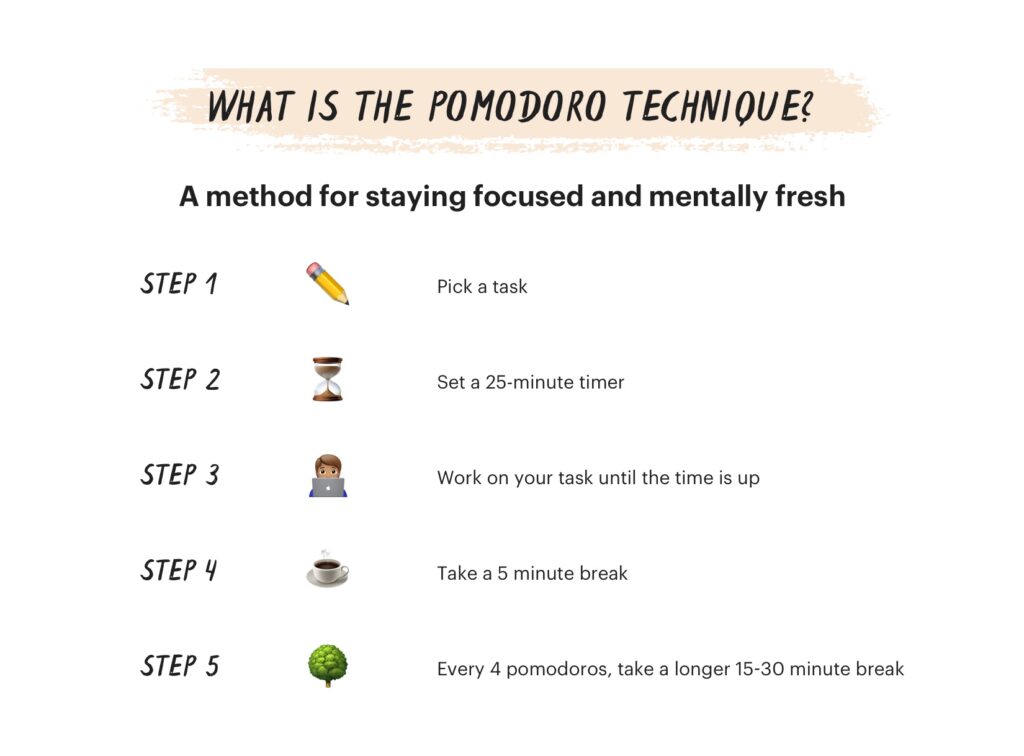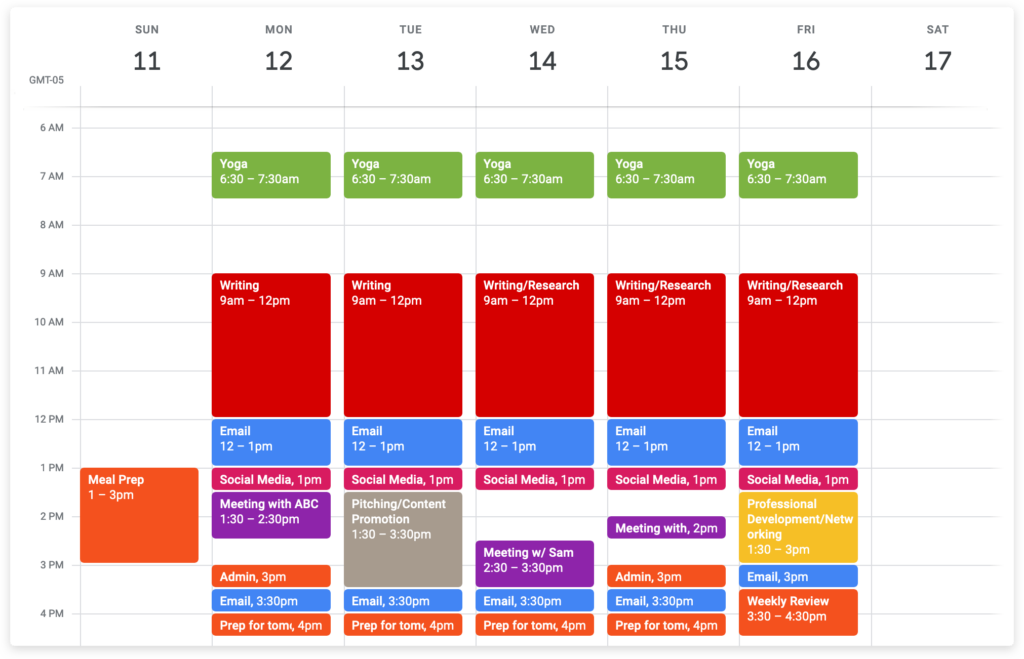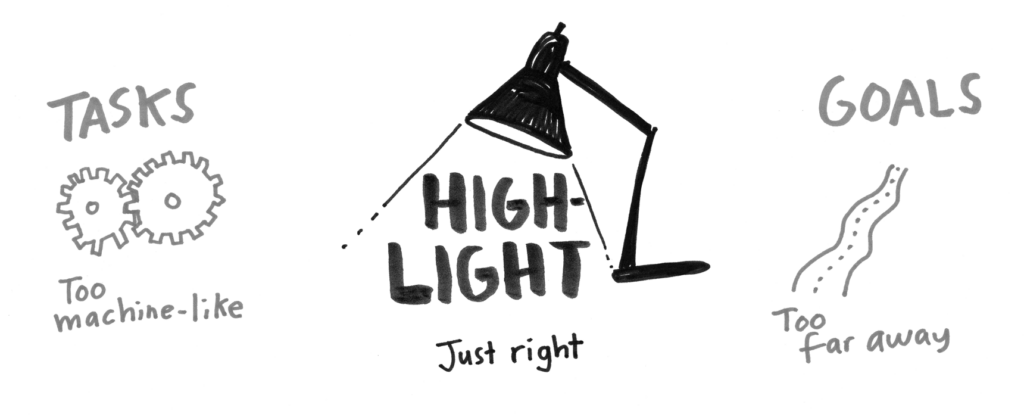Whether you are in college or about to graduate, productivity lies at the heart of success. I often wonder why some people excel at life while others, not so much. Hence, in my search, I have found various methods or “hacks” that enable people to lead productive lives. You can think of this as an amalgamation of the productivity hacks discussed in those top-selling books such as “How to get things done” by David Allen. So if you are curious and want to incorporate some of these hacks in your life, keep reading.
In this Article
1) Promadora Technique by Francesco Cirillo
Popular amongst students, the Promadora technique allows you to study or focus on a task for a set amount of time, followed by a short break. Typically, a student would study for 25-30 minutes nonstop and, by the end, would take a short 5-minute break.
The idea is that you should set a timer for 25-minute intervals, which introduces a sense of urgency. Hence, instead of thinking you have all day to work or study, you break your work time into segments and get more done.
People who struggle with procrastination often find that the more time they have, the more they tend to delay their work. This leads them towards a perfect blend of anxiety and regrets when the deadline finally arrives.
Therefore, when you break down your available time into chunks, you end up accomplishing more due to the sense of urgency. However, some people may find that 25 minutes is too short of an interval to get substantial work done. In this case, you can extend the time to 40 or 45 minutes with a 10-minute break after each interval.
2) Delegating Time Consuming and Redundant Tasks
This one is especially helpful for those who have started out new businesses and cannot find the time to do everything themselves. The idea goes that every person has a certain hourly rate, and if you can hire someone to do the mundane tasks for you for lower than your hourly rate, you end up saving time and money.
Thanks to the internet, you can practically hire a freelancer for almost anything. Begin by determining what an hour of your time is worth. Let’s say you have started a small business, and your hourly rate comes out to $20. Now, instead of doing time-consuming stuff like book-keeping and scheduling on your own, you can hire someone to do it for you for that hourly rate or lower.
This way, you can focus on the big-picture stuff and let someone else take care of the day-to-day stuff. You end up saving time and money without having to spend time and effort that is best spent in other areas.
Websites like fiverr.com, upwork.com and freelancer.com are great places to hire people for cheap.
3) The Two-Minute Rule by David Allen
Popularized by David Allen in his book “How to get things done“, the two-minute rule suggests that if a pending task only takes two minutes to complete, you should start it right away.
The idea is that lack of motivation is not what causes procrastination, but inaction does. You see, contrary to popular belief, you do not need the motivation to start doing something. Instead, it’s the doing that allows you to complete a task.
Think of a car in neutral gear on a slightly declined road. If you were to move this car from a standstill by exerting force, it would take quite a bit of force to get it moving. Once it moves even a few inches, pushing it becomes easier, much more easier as it gains momentum.
The same thing is true for work or any activity that seems difficult to start. By telling yourself that you will only spend two minutes on something, you are likely to start doing it without that initial pushback.
You can use this method to do ordinary things around the house, like cleaning your room or taking the trash out. However, once you get going, you will find that you have an easier time beginning a task even it takes longer than 2 minutes, such as studying or working.
4) The Two-Day Rule

Sometimes we fall into the trap of telling ourselves that we can do a task daily no matter what. This task can be anything but let’s take working-out at the gym as an example. So you got yourself a gym membership and promised yourself that you would hit the gym daily for 6 days a week. You also have a full-time job and other obligations that take up most of your day.
Now what would end up happening is that you will inevitably miss the gym due to your workload and would feel disappointed and demotivated.
You see, the problem is that you started out by setting an unrealistic expectation. Instead of chaining yourself to an impossible routine, tell yourself that you wouldn’t allow yourself to miss the gym for two days in a row.
This sort of approach lightens the burden on you while making you feel accomplished. Now, instead of feeling the pressure of going to the gym daily, you can miss a day in between while still remaining motivated and accomplished.
5) Time Blocking
College students normally don’t plan out their week or month in advance, which is a huge mistake. Time blocking aims to solve this by suggesting that you should clearly demarcate a day for a task in advance on a calendar. It sounds simple, but it really works.
The idea is that when we go about our days without a clear understanding of what needs to be done on what day. We tend to get paralyzed when we do have a day off because there are so many things we could do.
Hence, instead of figuring out randomly what needs to be done on a given day, mark down the task on a calendar in advance so that when the day arrives, you already know what needs your time and effort.
This can save you a lot of hassle and time on the days when you are free. It does require some effort on your part to sit down and determine which days are best for which task.
6) Differentiate the System from the Goal

Normally when we set out to achieve something, we usually only look at the goal. If you think about it, there is a second more important aspect that is the system whereby you get to the goal.
People who end up doing great things in life don’t just start one day on a whim. Instead, they recognize the goal and then put all the effort into devising a system that will get them to that goal. If you spend all your time obsessing over the end result, you might overlook crucial mistakes in the mechanism.
Moreover, when you are aware of the system and actively try to perfect it, you are far more likely to stay focused on the task. Hence, this can also have the effect of keeping you motivated as you work to achieve that goal.
7) To-Do Lists

The only reason you don’t hear about to-do lists more often is because people take them for granted. You will be pleasantly surprised by how well they work. Due to our tendency to not paying attention to seemingly obvious things, we rarely ever make one.
Here is why they work.
When you need to get something done, you often only entertain the thought of doing it in your head. Before you can act on it, you get distracted by a million other things hence delaying the task.
A to-do list provides a solution to this by organizing the tasks on a piece of paper.
Now, instead of it all cluttered in your head, you see them in written form and can work your way through the list one by one feeling accomplished.
This is also the reason why serial procrastinators swear by to-do lists. In contrast to popular opinion, you don’t need the motivation to get something done. Our idea of motivation is backwards. It is typically believed that motivation is the first step towards a goal. In reality, motivation is the by-product of action. In fact, you must have noticed this yourself; think back to the time when you couldn’t find an ounce of motivation to write a paper in college. But when you did finally start writing due to the impending deadline, you ended up finishing the task on time.
In most cases, what is difficult is to take that initial step and gradually increase the momentum. How does this apply to to-do lists? Well, when you feel completely drained of any motivation or drive, make a to-do list of common easy-to-do tasks such as folding your clothes, cleaning your room, taking a shower etc.
Place them in order from easiest to the most difficult. Start by doing the easy tasks one by one and tick them off as you go along. You will see that once you get into the groove, you will find it increasingly easy to get things done.
8) Setting Daily Highlights
One of the biggest mistakes students and people in general make is they let their minds meaninglessly wander when they have free time. They worry about achieving goals but then when it comes the time to do something; they are unsure what it is that they need to do.
The idea goes that if you lack an understanding of what the next day is for, you are less likely to get something done.
You might have experienced this already. Think about when you have a cluttered mind and no real plan on what you want to achieve on a given day.
Don’t you remember being overwhelmed by the many things that you could do?
This indecisiveness brought on by the lack of prior commitment leaves you anxious and unsure.
Hence, when you have something that you know is urgent, dedicate the next day to it with the understanding that it is the only thing you will focus on. This way, you won’t waste any time planning on the day of.





